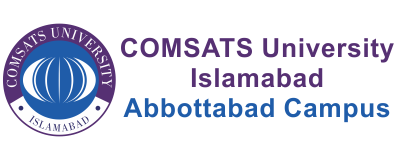Practical Training (including the nature, duration, and location of the training)
The Department of Pharmacy at COMSATS University Islamabad (CUI) provides comprehensive training facilities to its Pharm.D. students, aiming to equip them with the knowledge, skills, and attitudes necessary for successful careers in pharmacy practice. These training facilities encompass clinical and industrial settings, and field trips, allowing students to gain practical experience and hands-on exposure to real-world pharmacy scenarios and provide students with invaluable opportunities to apply theoretical knowledge in practical settings, develop critical thinking and problem-solving skills, and foster professional competencies required for effective patient centered care, pharmaceutical industry roles, and academic pursuits. Through these facilities, CUI ensures that its Pharm.D. graduates are well-prepared to meet the demands of the rapidly evolving healthcare landscape and make meaningful contributions to the pharmacy profession and public health.
A: Clinical Pharmacy Clerkship
The clinical pharmacy clerkship offers students a valuable opportunity to gain practical experience in a healthcare environment, enhancing their skills and understanding of pharmacy practice.
- Purpose:
To enable the coordinated and collaborative implementation of the Pharmacy Clinical Clerkship curriculum through integrated representation from the Department of Pharmacy to provide students with the knowledge, skills, and attitudes essential to effective, and efficient patient-centered care.
II. Clinical Pharmacy Curriculum
The curriculum has been developed by the Pharmacy Council of Pakistan (PCP) and the Higher Education Commission (HEC), Pakistan.
It is designed to produce pharmacists who have the abilities and skills which are necessary to achieve outcomes through:
- providing pharmaceutical care
- developing and managing patient-based pharmacotherapy
- promoting public health
- providing drug information
III. General Introduction
- A report related to clinical pharmacy practices will be completed by the students and will be evaluated by the external examiner invited from other universities, clinical setups, hospitals, and community pharmacies.
- Students will also complete a report independently or in a group on a Drug Use Evaluation.
- Students will take the assignment tasks to enhance verbal presentation, communication, written and problem-solving skills, critical analysis of data, and provision of care through weekly conferences and projects.
IV. Training Objectives
- Observe and practice professional skills required for a Clinical/Hospital Pharmacist.
- Understand the etiology of a disease.
- Recognize the clinical features of a disease.
- Comprehend various lab and diagnostic tests.
- Find clinical literature from drug information sources.
- Identify different drug-drug interactions.
- Describe the use of different antidotes.
- Acquire knowledge of drugs used in pregnancy.
- Gain familiarity with newer medicinal agents
V. Clerkship Aspects
Clerkship in the clinical setting is mandatory for a period of 2 years (4 semesters). A project related to clinical pharmacy must be completed by the students during their 9th and 10th semesters and must be evaluated.
Students are required to present verbal presentations, communication, written and problem solving skills, and critical analysis of data through a weekly/monthly conference and projects. Students should acquire experience in clinical pharmacy practice in various settings such as cardiology, medicine, psychiatry, nephrology, pediatrics, pulmonology, emergency, oncology, and surgery in Ayub Teaching Hospital, Abbottabad, and King Abdullah Teaching Hospital, Mansehra.
VI. Activities in 7th to 10th Semesters of Pharm.D Program
- It is mandatory for the students to visit different wards of the King Abdullah Teaching Hospital, Mansehra on a weekly basis according to their pre-planned rotational schedule.
- Students are divided into different groups and each group is assigned a specific ward/specialty (i.e. Medicine, Emergency, ICU, Orthopedics, Surgery, Pediatrics, Obstetrics, and Gynecology) in each visit.
- The students are trained to understand various components of the patient’s profile and medication history.
- They are required to obtain case histories and perform pharmaceutical care analysis. They are also required to present their work on a weekly basis to the respective supervisor in order to evaluate their level of understanding and incorporate any deficiencies, if found, on an intermittent basis.
- It is compulsory for students to submit a comprehensive report encompassing all details therein based on activities performed within the hospital.
- The final defense is carried out under the supervision of the Head of Department, respective course teacher, and external examiner which is a mandatory requirement for a Pharm D degree.
Clinical/Education Work Hours
The students visit the respective placements during the week with a minimum of 6 hours per week (Cumulative of 408 hours in total) and spend their time during regular working hours for most learning experiences and participate in rounds with the medical team to accomplish their clerkship goals.
VII. Clerkship Report at the end of the 8th semester
The format of the clinical pharmacy clerkship report will be as follows:
- Title page
- Table of contents
- Introduction
- Patients and clinical settings
- List of common medical abbreviations
- List of normal lab values
- Case histories (minimum 20 in number)
- Disease patterns in different wards of the hospital
- Overall prescribing patterns in the hospital
VIII. Assessment Criteria
To be submitted in the 7th and 8th semester Total Marks = 50
- 20 marks for written (evaluation of case history)
- 20 marks for viva voce.
- 10 marks for clinical pharmacy clerkship report (hard copy)
- General Project Format in 9th and 10th semester
Chapter 1: Introduction (15-20 Pages maximum)
- Introduction to disease (change according to the topic)
- Pathophysiology
- Epidemiology
- Risk factors
- Signs & symptoms
- Lab and diagnostic tests,
- Evidence-based practice guidelines
Chapter 2: Methodology
- Project data collection through Modified PWDT form
- Duration/Period
- Setting/Hospital/Ward/Specialty
- Sample Participants
- Analysis for drug related problems
- Outcome parameters.
Chapter 3: Results and Discussion
The results of this study, are presented in graphs and tables. In this description, the results are briefly summarized, and the discussion is framed as an opportunity to explore the meaning and significance of the findings based on a particular clinical guideline.
Chapter 4: Conclusion
In this section, the findings are concluded with respect to the medication guidelines.
References
Standard citation and bibliography styles commonly used in the field like Vancouver style may be used.
COMSATS University Islamabad enforces a rigorous plagiarism policy, ensuring that all academic documents, including theses, dissertations, and project reports, undergo thorough scrutiny using Turnitin, a similarity detection software endorsed by the Higher Education Commission of Pakistan. The plagiarism policy of the University shall be applicable i.e. below 20 % similarity index range is acceptable.
X. Assessment Criteria
- Introduction
- Methodology
- Data collection
Marks: Total =50
- 30 for final submission
- 20 for during semester performance
- Results and discussion • Project hard binding
Marks: Total =100
- 30 for final submission
- 20 for during semester performance
- 50 marks for viva voce to be marked by external examiner from other universities
B: Industrial Pharmacy/Community Pharmacy/Hospital Pharmacy Training:
All candidates pursuing a Pharm.D degree are required to complete a minimum of 350 hours of practical training within the pharmacy setup i.e. pharmaceutical industry, hospital pharmacy and/or community pharmacy. This training should be spread over six weeks and can be undertaken after the conclusion of the 7th semester of Pharm.D studies and before the commencement of the 8th semester. Additionally, students have the option to engage in training during the semester breaks of the 8th and 9th semesters.
Industrial Pharmacy
The training encompasses various sections of the pharmaceutical industry, including: • Raw and Packaging Material Handling
- Manufacturing Sections:
- Tablet Production
- Capsule Production
- Syrup Manufacturing
- Suspension Manufacturing
- Ointments and Creams Production
- Injectable Manufacturing
- Quality Control
- Quality Assurance
- Finished Goods
- Pharmaceutical Research and Development
Upon completion of the training, each student is required to prepare a comprehensive report detailing their experiences. This report must be endorsed by the authorized personnel of the training organization and submitted to the head of the institute for assessment and evaluation.
Note: During 7th and 8th semester, students participate in a study tour to pharmaceutical industries. During this visit, they gain insight into the operations of the pharmaceutical industry. Subsequently, students are required to compile and submit a detailed report based on their observations and learnings from the industry visit. This report will undergo evaluation as part of the practical examination.
Community Pharmacy
The training facility for community pharmacy by the Department of Pharmacy, COMSATS University Islamabad provides students with invaluable hands-on experience in a real-world pharmacy setting. Here, students have the opportunity to interact with patients, dispense medications, provide counseling on medication usage and potential side effects, and collaborate with other healthcare professionals. Through supervised practical sessions, students learn to manage inventory, maintain patient records, and ensure compliance with regulatory standards. This training equips students with the practical skills and knowledge necessary to excel in community pharmacy practice, fostering their ability to contribute effectively to patient care and public health within local communities.
Hospital Pharmacy
The hospital pharmacy training facility by the Department of Pharmacy, COMSATS University Islamabad offers students a dynamic learning environment within the healthcare setting. Here, students engage in a wide range of activities, including medication dispensing, compounding sterile and non-sterile preparations, medication reconciliation, and participation in multidisciplinary patient care teams. Under the guidance of experienced pharmacists and healthcare professionals, students gain practical experience in managing medication therapy, ensuring patient safety, and optimizing medication use. Through hands-on training in various hospital departments such as cardiology, oncology, and critical care, students develop the clinical skills and competencies necessary to provide comprehensive pharmaceutical care to patients in diverse healthcare settings. This training prepares students to address the complex medication needs of patients and contribute effectively to the healthcare team in hospital pharmacy practice.
C: Medicinal plants collection trips (3rd and 4th Semesters)
The medicinal plants collection tour which is an integral part of the syllabus offered by the Department of Pharmacy, COMSATS University Islamabad provides students with a unique opportunity to explore the rich biodiversity of medicinal flora. Led by experienced pharmacognosists and herbalists, students embark on guided excursions to diverse natural habitats, where they learn to identify, collect, and classify medicinal plants. During these tours, students gain firsthand knowledge of the therapeutic properties, traditional uses, chemical constituents, and conservation practices associated with indigenous plant species. Through hands-on experience in plant identification, harvesting techniques, and sustainable harvesting practices, students develop a deep appreciation for the ecological significance of medicinal plants and their role in traditional and modern healthcare systems. This immersive learning experience enhances students’ understanding of pharmacognosy, herbal medicine, and botanical pharmacology, enriching their education and fostering a deeper connection to nature and holistic approaches to healthcare. At the end of the trip, all students prepare a detailed report of the collected and preserved plant material along with all their relevant details.

